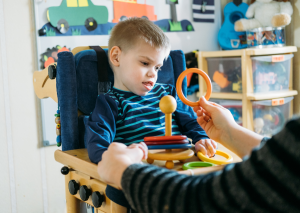ADILIFE POLYCLINIC SERVICEs FOR
Pediatric Neurology Services

Child Development Center
A Child Development Center is a vital institution designed to provide a nurturing and enriching environment for the holistic growth and development of young children. These centers play a pivotal role in supporting children's physical, cognitive, emotional, and social development during their early years, which are widely recognized as a critical period for laying the foundation of lifelong learning and well-being.Through a combination of structured activities, play-based learning, and caring interactions, Child Development Centers aim to foster a child's natural curiosity, creativity, and social skills, ultimately setting the stage for their future success and contributing to the betterment of society as a whole.

Epilepsy
Epilepsy is a neurological disorder characterized by recurring and unpredictable seizures, which are caused by abnormal electrical activity in the brain. These seizures can vary in intensity and manifestation, ranging from brief periods of altered consciousness or muscle twitches to more severe convulsions. In some cases, surgery or other medical interventions might be considered. People with epilepsy can lead fulfilling lives with appropriate management and support. It's important for individuals with epilepsy to work closely with healthcare professionals to determine the best course of action for their specific situation.

Cerebral Palsy
Cerebral Palsy (CP) is a group of neurological disorders affecting movement and muscle control, caused by brain damage before or after birth. It leads to difficulties in coordination, posture, and muscle function. While not progressive, CP's impact can change as individuals grow. Treatments like therapies, medications, and interventions can help manage symptoms and improve daily life. Early intervention is crucial for better outcomes.

Movement Disorder
A movement disorder refers to a group of conditions characterized by abnormal and involuntary movements or changes in movement patterns. These disorders can affect different parts of the body and can lead to various symptoms such as tremors, jerky movements, stiffness, slowness, and difficulty in coordinating movements. Movement disorders are often caused by disruptions in the brain's circuits that control movement. They can be caused by a range of factors, including genetic mutations, brain injuries, neurodegenerative diseases, or certain medications.

Headache & Stroke
Headache refers to pain in the head and can have various causes. It's usually not life-threatening and can be managed with treatments. Stroke, on the other hand, is a severe medical emergency caused by interrupted blood flow to the brain. It leads to sudden symptoms like numbness, confusion, and severe headache. Some strokes can cause severe headaches, such as thunderclap headaches, which can be a sign of bleeding in the brain. If someone experiences a sudden, severe headache along with other stroke symptoms, immediate medical help is crucial to prevent lasting damage or disability.

Down’s Syndrome
Down syndrome, also known as trisomy 21, is a genetic disorder characterized by the presence of an extra copy of chromosome 21 in a person's cells. This additional genetic material leads to developmental differences and physical characteristics. Individuals with Down syndrome typically exhibit varying degrees of intellectual and developmental delays, as well as distinctive facial features. Some common features of Down syndrome include almond-shaped eyes, a flat facial profile, a small nose, and a protruding tongue. However, it's important to note that each person with Down syndrome is unique and can have a wide range of abilities and challenges.

Clinical Neurophysiology
Clinical Neurophysiology is a medical specialty that focuses on diagnosing and assessing disorders of the nervous system through the measurement and interpretation of electrical activity generated by the nervous system. This field utilizes various techniques, including Electroencephalography (EEG), Electromyography (EMG), and Nerve Conduction Velocity (NCV) studies.

Genetic Diagnostic Facilities
Genetic Diagnostic Facilities are advanced medical centers equipped with cutting-edge technology and expertise to diagnose and analyze genetic disorders and conditions. These facilities play a crucial role in identifying variations or mutations in an individual's DNA that can lead to hereditary diseases, birth defects, or predispositions to certain health conditions. Genetic diagnostic tests, ranging from karyotyping and polymerase chain reaction (PCR) to next-generation sequencing, are conducted to assess an individual's genetic makeup and pinpoint any abnormalities.
Lets get started try our service
If you have any questions or concerns, please feel free to reach out to us
